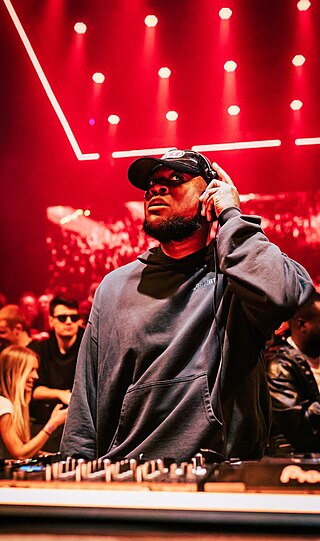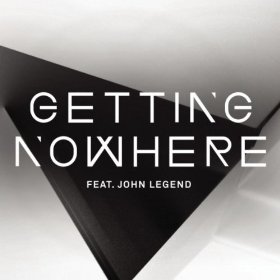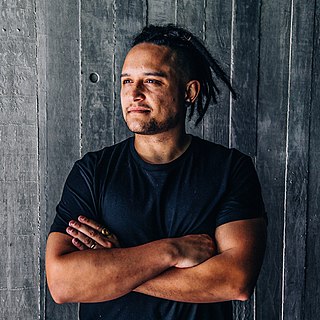Related Research Articles
UK bass, also called bass music, is club music that emerged in the United Kingdom during the mid-2000s under the influence of diverse genres such as house, grime, dubstep, UK garage, R&B, and UK funky. The term "UK bass" came into use as artists began ambiguously blending the sounds of these defined genres while maintaining an emphasis on percussive, bass-led rhythm.
Dubstep is a genre of electronic dance music that originated in South London in the early 2000s. The style emerged as a UK garage offshoot that blended 2-step rhythms and sparse dub production, as well as incorporating elements of broken beat, grime, and drum and bass. In the United Kingdom, the origins of the genre can be traced back to the growth of the Jamaican sound system party scene in the early 1980s.

Chris Reed, also known as Plastician, is an electronic musician from Thornton Heath in the London Borough of Croydon.
Tempa is a garage and dubstep music label founded in 2000 by Neil Jolliffe, who also coined the term "dubstep" in 2002.

Digital Mystikz are a dubstep production duo consisting of Mala, and Coki from the South London suburb of Norwood. Along with Loefah and SGT Pokes, who make up the group ASBO, they operate the DMZ record label and host the influential bimonthly nightclub DMZ, held at the Mass club complex in Brixton, London. BBC Radio 1 DJ John Peel was an early supporter of Digital Mystikz, eventually putting them in his annual 2004 top 50 list at number 29. They are among the scene's most famous producers. Their song "Anti War Dub" appeared in the 2006 film Children of Men, although it wasn't included in the soundtrack. In the summer of 2008, Mala was chosen to headline the night portion of the Sónar Festival in Barcelona. In April 2011, Mala travelled to Cuba with Gilles Peterson who was returning to Havana to produce the second installment in the Havana Cultura series. While Peterson recorded new material with local musicians, Mala began work on a new album Mala in Cuba, which was released in September 2012.
2-step garage, or simply 2-step, is a genre of electronic music and a subgenre of UK garage. One of the primary characteristics of the 2-step sound – the term being coined to describe "a general rubric for all kinds of jittery, irregular rhythms that don't conform to garage's traditional four-on-the-floor pulse" – is that the rhythm lacks the kick drum pattern found in many other styles of electronic music with a regular four-on-the-floor beat.

Oliver Dene Jones, known as Skream, is an English electronic music producer based in Croydon. Skream has released records on several British record labels, such as Tempa, Tectonic, and Big Apple Records, and has performed throughout Europe, the US, Canada, Australia, and Japan, as well as the UK. Skream is known as an early and influential architect of the dubstep genre.
Skull Disco was an independent dubstep record label, based in Bristol, England. It was established in 2005 by Sam Shackleton and Laurie "Appleblim" Osborne, and ended in 2008. Releases on the label prominently featured African and post-African percussion, as well as "ethnic" samples. Zeke Clough contributed distinctive artwork for the label, drawing on both Egyptology and heavy metal imagery.
Soundproof are English dubstep producers and DJs born and raised in West London. Jamie and Yung-e (Soundproof) would try their luck at the door and sometimes would make it in to the rave. Seeing the DJs inspired them to get turntables and start buying drum and bass vinyl. When the dark garage sounds started to emerge they were straight on to that. With producers like EL-B, Zed Bias and Landslide inspiring them to take the next step in to music production. Over 2 years they would pass new beats to DJs like Distance, Coki and Leofa. This led to them getting signed to one of the first ever Dubstep labels 'BOKA Records'. Their first ever release was '3 Degree's' which featured on 'The low end dubs ep' alongside Distance and SLT Mob. They were appearing on vinyl with some of the best in the newly formed Dubstep scene.

Adegbenga Adejumo, known as Benga, is a British musician from Croydon, known for being a pioneer of dubstep record production. He has been featured on a variety of compilations including Mary Anne Hobbs's Warrior Dubz, Tempa's The Roots of Dubstep and the BBC Radio 1Xtra anniversary mix.
Horsepower Productions are an English electronic music duo, initially a larger musical collective who released experimental garage recordings, and helped pioneer the dubstep genre.

Rinse FM is a London-based community radio station, licensed for "young people living and/or working within the central, east and south London areas". It plays garage, grime, dubstep, house, jungle, UK funky and other dance music genres popular in the United Kingdom.
Distance is a British dubstep producer and DJ. He also founded the record label Chestplate, whose sonic direction followed his style, fusing metal influences with dubstep templates.

Magnetic Man is an English electronic music project from London, consisting of dubstep producers and DJs Benga, Skream and Artwork. The trio first met in the late 1990s at the Big Apple Records store in Croydon. They performed using three computers, one playing drum samples, one playing basses and the third playing leads and other samples. Artwork controlled the master laptop, to which the other two are synchronised via MIDI. Their sets usually consisted of a mix of original tracks produced together, and live remixes of Benga and Skream's tracks, accompanied by synchronised projected visuals by Novak Collective. They signed to Columbia Records in 2010. Magnetic Man completed their first full-length sellout tour on 5 November 2010. Their self-titled debut studio album, Magnetic Man, was released through Sony by Columbia Records on 10 October 2010.
Tectonic is a British electronic music label, founded and run by Rob Ellis (Pinch) which focuses primarily on dubstep and its related genres. As one of the founding dubstep labels, alongside Tempa, DMZ, Hyperdub, and Hotflush, Tectonic became a focal point for the Bristol scene, as well as introducing artists and releases that were among the first to bridge a gap between dubstep and techno.

"Getting Nowhere" is a song by English electronic music project Magnetic Man featuring American singer John Legend. It is the third single to be released from their debut album Magnetic Man. It was released on 18 February 2011. It only managed to peak to number 65 on the UK Singles Chart but had some success in Flanders where it reached number four. The song was also used in a Sony PlayStation Move advert in November 2011.
Oliver Dene Jones, known as Skream, is an English electronic music producer based in Croydon.

Jesse Cooper, known under the pseudonym Mt Eden, is a New Zealander electronic music artist based in Auckland. Popular tracks include "Sierra Leone" – a remix of Freshlyground's "I'd Like" – and remixes of Delerium's "Silence" as well as Lisa Miskovsky's "Still Alive".

Terry Leonard, better known as DJ Hatcha or simply Hatcha, is a South London producer and DJ notable for his seminal work in the musical genre dubstep. He had a regular show on the prominent pirate radio station Rinse FM in the early 2000s, before bringing dubstep to a wider audience with his regular show on mainstream radio station Kiss FM.
Rowan Tyler Jones, known by his stage name Route 94, is an English record producer and remixer from Richmond, London. Initially producing dubstep as Dream, Jones worked with the likes of Skream, Benga and Katy B. He then began producing house music. His single "My Love" was a commercial success, reaching number one in three charts.
References
- ↑ "Rare footage of Croydon's Big Apple Records". GetDarker. 2015-01-29. Retrieved 2023-10-05.
- ↑ "Croydon, community, soundsystem culture: Tracing the history of dubstep". Red Bull. 2020-06-12. Retrieved 2023-10-05.
- ↑ Artwork (2010-09-10). "Magnetic Man: a brief history of dubstep". The Guardian. ISSN 0261-3077 . Retrieved 2023-10-06.
- 1 2 Dubstep Heritage - Location 02 - Big Apple Records [Croydon] , retrieved 2023-10-06
- ↑ "This record shop is the last bastion of Croydon's legendary dubstep scene – Eastlondonlines". www.eastlondonlines.co.uk. Retrieved 2023-10-06.
- ↑ "Borough's rich musical culture celebrated in Croydon's Music Heritage Trail". Newsroom. Retrieved 2023-10-06.
- ↑ "BBC Radio 1 - Radio 1's Residency - Artwork". BBC. Retrieved 2023-10-25.
- 1 2 3 Kennedy, John (2020-09-27). "Facebook". www.facebook.com. Retrieved 2023-10-07.
- ↑ "UK Garage History & Family Tree: 20 Years of UKG!". 2003-01-28. Retrieved 2023-10-07.
- ↑ "UK Garage Music Guide: Inside the History of UK Garage". Masterclass. 2021-06-07. Retrieved 2023-10-07.
- ↑ "The Primer: Dubstep". The Wire . No. 279. April 2011. ISSN 0952-0686.
- ↑ O'Connell, Sharon (4 October 2006). "Dubstep". Time Out London . Time Out Group. Archived from the original on 29 July 2012. Retrieved 2023-10-06.
- ↑ "Big Apple Records". Discogs. Retrieved 2023-10-06.